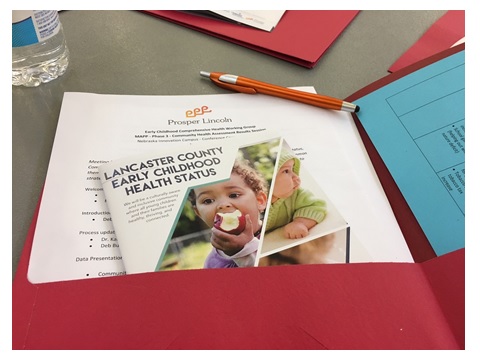How do we accomplish the Prosper Lincoln goal to nurture every child on the path to success? The answer is multi-dimensional. One particular dimension is health, and the Prosper Lincoln Early Childhood Comprehensive Health Working Group recently released the latest health assessment to serve as a measurement benchmark.
Nearly 100 individuals representing schools, health care providers, government agencies, nonprofits and the community, gathered for a Health Working Group meeting on June 22, 2018 at Innovation Campus. They reviewed the findings of the Lancaster County Early Childhood Health Status, a collaborative report lead by Voices for Children in Nebraska, Children’s Center for the Child and Community and Prosper Lincoln.
“The Lincoln Early Childhood Network Comprehensive Health Work Group is completing a comprehensive, deliberative process that continues to deeply engage the community,” said Michelle Suarez, Early Childhood Developer for Prosper Lincoln. “The strength and assets of the people around the table provide the leadership, insights, data and strategies that will continue to resonate in our community and help us achieve our vision of ensuring that all children and their families have what they need to thrive and prosper.”
Some findings for Lancaster County included:
- 20% of 0-8 year olds are living below the poverty line and 44% are living in low-income families who may struggle to reach economic stability, despite the fact that nearly 74% of all parents are working and 86% of all single parents are working.
- Only 5% of 0-8 year olds are without health insurance, the lowest it has been in decades, most likely a result of the Affordable Care Act
- Prenatal care is especially inadequate for our American Indian and Black population.
- LPS provides dental, hearing and vision screenings annually. At least 62% of those referred for a follow-up received the care they needed.
- 6,828 children receive SNAP (food stamp) benefits. An addition 3,000 likely qualify but do not receive the benefit.
- As an indicator of sound mental health, a sample of children were evaluated for ACEs (adverse childhood experiences). 37.6% of the sample of 6-11 year olds had experienced 1 or more ACE including 10.4% of children had a parent or guardian incarcerated.
The report is a result of Phase 3 in a community roadmap to health called MAPP (Mobilizing for Action through Planning and Partnerships). Prior phases included developing partnerships and creating a shared vision.
Now that the assessment has been completed, the next step is to identify common themes relative to child health in Lincoln and Lancaster County in order to prepare for strategic action. Participants delved into what the data indicates for our community, what conditions could be fueling the trends, what questions remain and identified urgent and critical issues that could help form key strategies.

